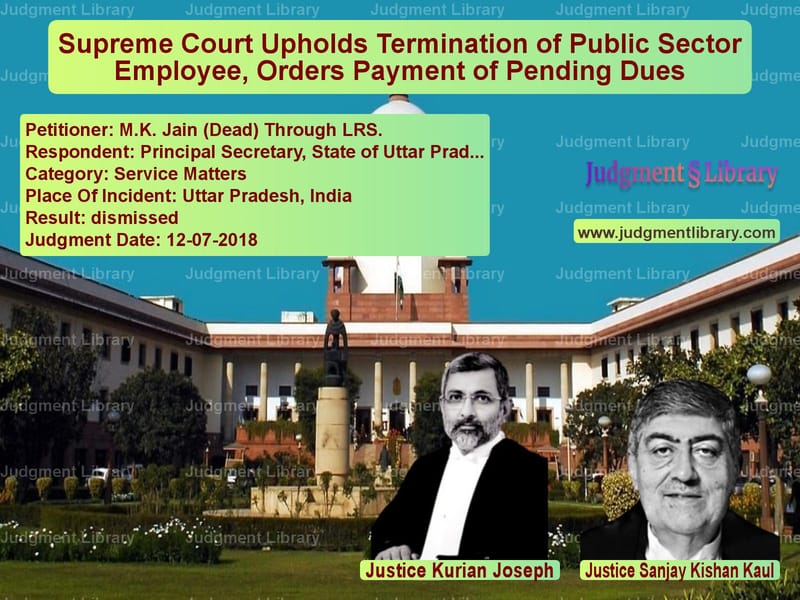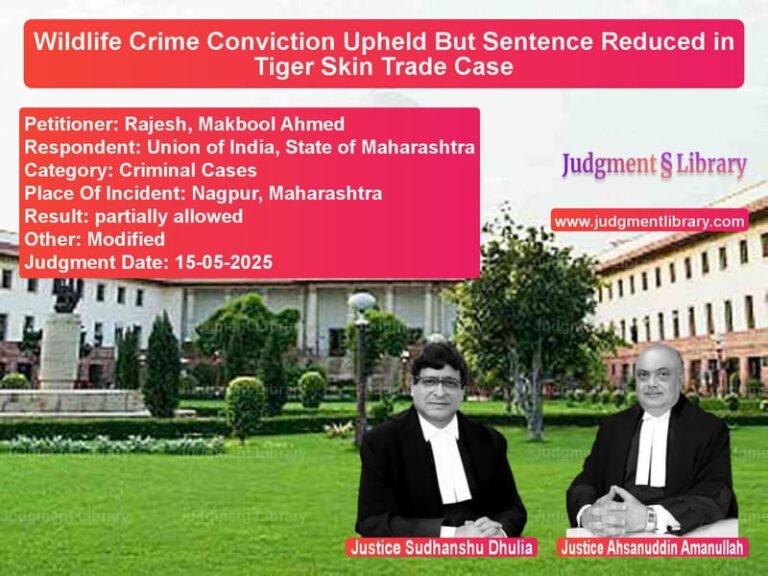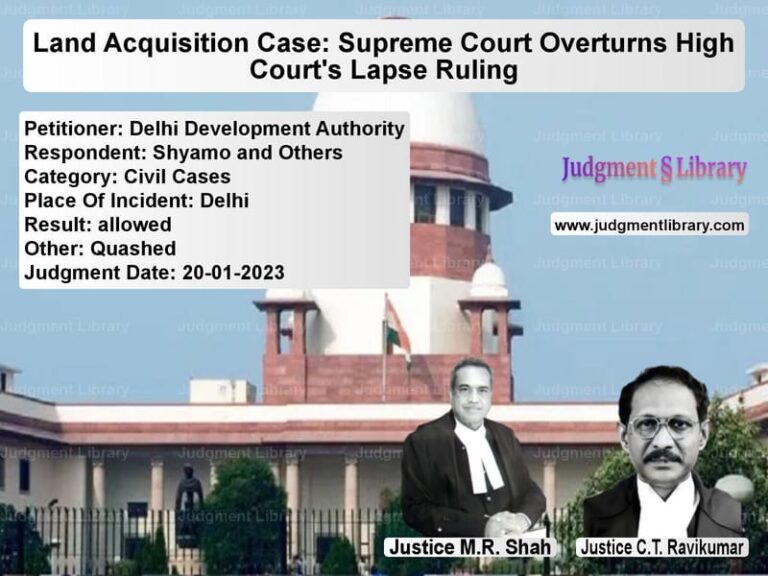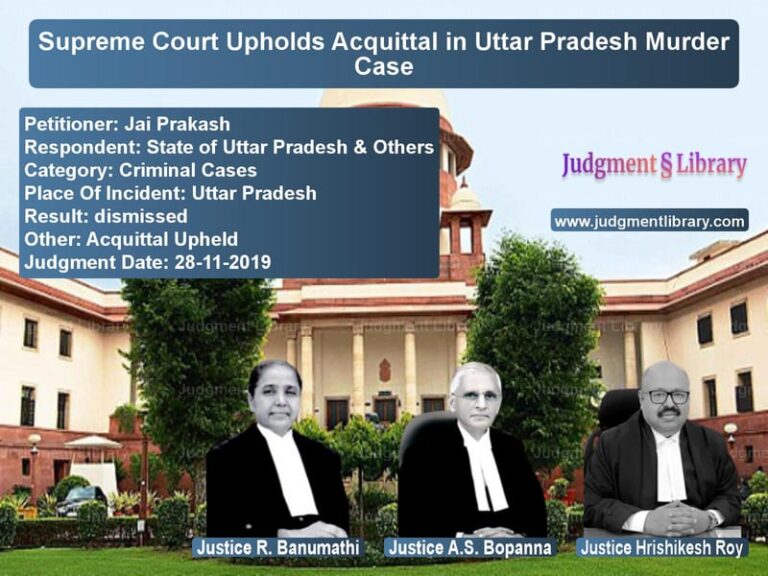Supreme Court Upholds Termination of Public Sector Employee, Orders Payment of Pending Dues
The Supreme Court of India, in M.K. Jain (Dead) Through LRS. vs. Principal Secretary, State of Uttar Pradesh & Ors., delivered a significant ruling concerning employment termination and payment of dues for a deceased employee. The case involved the termination of the appellant from government service and subsequent disputes regarding unpaid subsistence allowances and benefits. The Supreme Court upheld the termination but directed the state government to verify and pay all pending dues, including subsistence allowance during suspension, if not already paid.
Background of the Case
The appellant, M.K. Jain, was employed under the State of Uttar Pradesh but was terminated following departmental proceedings. The controversy arose due to the dissolution of Respondent No.2/Nigam in the year 2000, which led to the absorption of its employees into various departments of the State of Uttarakhand.
The appellant challenged the termination, arguing that it was unlawful and that he had not received the full subsistence allowance owed to him during the period of suspension. The case prolonged due to legal proceedings, and before its conclusion, the appellant passed away on December 7, 2007. His legal heirs continued the case, demanding payment of all pending employment dues, including pension and gratuity.
Legal Issues in the Case
- Whether the termination of the appellant was lawful and justified.
- Whether the appellant’s legal heirs were entitled to receive pending employment dues, including subsistence allowance.
- Whether the state government had fulfilled its obligations in verifying and settling outstanding payments.
- Whether compensation, in the form of interest, should be granted for any delay in payments.
Petitioner’s Arguments
The appellant’s legal heirs contended:
- The termination was unjust and lacked procedural fairness.
- The deceased employee was entitled to subsistence allowance during his suspension, which had not been fully paid.
- The legal heirs should be compensated for the undue delay in settling financial dues.
- Given that other employees were absorbed into the State of Uttarakhand, the appellant should have been reinstated or allowed pensionary benefits.
Respondent’s Arguments
The State of Uttar Pradesh and other respondents countered:
- The termination was based on proven charges and upheld by concurrent judicial findings.
- The termination process followed legal and procedural requirements.
- The subsistence allowance had been paid to the extent required by law, and no further dues remained.
- The appellant’s legal heirs had no claim over pensionary benefits due to the nature of his termination.
Supreme Court’s Observations
The Supreme Court carefully reviewed the evidence, procedural fairness, and financial obligations of the state. It ruled:
“Having regard to the charges which have been proved in the inquiry and the concurrent findings thereon, we do not find any reason to interfere with the findings.”
However, the Court acknowledged the rights of the deceased appellant’s legal heirs in terms of pending financial dues. The Court directed the State to verify whether all employment-related payments, including subsistence allowance, had been settled. The Court also stressed that financial obligations owed to employees should not be arbitrarily withheld.
Final Judgment and Directives
The Supreme Court issued the following directives:
- The termination order was upheld.
- The State was instructed to verify whether all employment dues, including subsistence allowance, had been paid.
- If any amount remained unpaid, it was to be paid to the deceased appellant’s legal heirs.
- Any pending dues were to be paid with 18% interest per annum from the date they were due.
- The verification process was to be completed within three months from the date of the judgment.
- The judgment clarified that failure to comply would attract further legal consequences.
Implications of the Judgment
The ruling has several key implications:
- Fairness in Employment Terminations: The judgment reaffirms that lawful terminations will be upheld if due process is followed.
- Employee Rights and Pending Dues: Even in cases of lawful termination, employers must fulfill their financial obligations.
- Legal Heirs’ Rights: The ruling ensures that legal heirs can claim financial dues owed to deceased employees.
- Deterrent Against Financial Irregularities: The directive for 18% interest ensures accountability and discourages arbitrary withholding of payments.
Conclusion
The Supreme Court’s decision in M.K. Jain (Dead) Through LRS. vs. Principal Secretary, State of Uttar Pradesh & Ors. strikes a balance between upholding employment laws and ensuring financial justice for employees. The ruling serves as an important precedent for cases involving employment disputes, financial dues, and the rights of legal heirs. By ordering verification and payment of outstanding dues, the Court reinforces the principle that financial obligations must be met, even after an employee’s demise.
Petitioner Name: M.K. Jain (Dead) Through LRS..Respondent Name: Principal Secretary, State of Uttar Pradesh & Ors..Judgment By: Justice Kurian Joseph, Justice Sanjay Kishan Kaul.Place Of Incident: Uttar Pradesh, India.Judgment Date: 12-07-2018.
Don’t miss out on the full details! Download the complete judgment in PDF format below and gain valuable insights instantly!
Download Judgment: M.K. Jain (Dead) Thr vs Principal Secretary, Supreme Court of India Judgment Dated 12-07-2018.pdf
Direct Downlaod Judgment: Direct downlaod this Judgment
See all petitions in Employment Disputes
See all petitions in Pension and Gratuity
See all petitions in Public Sector Employees
See all petitions in Judgment by Kurian Joseph
See all petitions in Judgment by Sanjay Kishan Kaul
See all petitions in dismissed
See all petitions in supreme court of India judgments July 2018
See all petitions in 2018 judgments
See all posts in Service Matters Category
See all allowed petitions in Service Matters Category
See all Dismissed petitions in Service Matters Category
See all partially allowed petitions in Service Matters Category







